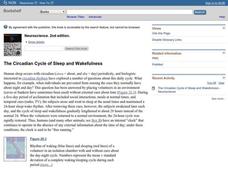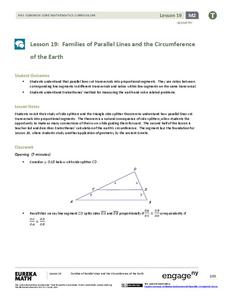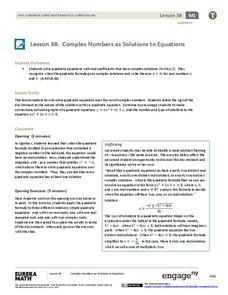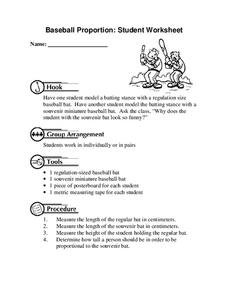Curated OER
Hoping Backward to Solve Problems
Students use number lines to compare differences. In this math lesson, students use a number line to solve problems. Students predict differences and answer puzzles using subtraction.
Curated OER
Jack Math Scramble
Students practice throwing and catching jacks to improve their hand-eye coordination. In groups, they participate in a variety of games in which they use the jacks to improve their problem solving skills. To end the lesson plan, they...
Curated OER
Math Investigations Facilitation Plan
In this math lesson plan, learners choose a topic involving math that interests them to investigate or research. Students make a plan detailing how they will investigate their topic; such as, keeping track of plant heights over time,...
Curated OER
Puzzled by Word Problems? See the Solution!
Learners apply basic number concepts and computation skills while discovering problem-solving strategies. The contribute to a group activity, while demonstrating a knowledge of math problem solving with individual dry-erase boards so...
Kenan Fellows
Introduction to a Flight Computer
Keep your hands on the wheel—at all times! Scholars learn why pilots use a flight computer through a high-flying demonstration. Making calculations for speed, distance, or time is automatic if you know how to use a flight computer.
Mathematics Assessment Project
Applying Angle Theorems
Polygon ... an empty bird cage? After finding the angles of a polygon, young mathematicians use the provided methods to solve the problem in multiple ways.
EngageNY
An Application of Linear Equations
Just how far will the Facebook post go? Lead a discussion on how to manipulate the sum of a geometric series to figure out a formula to find the sum at any step. The plan contains an alternative to the discussion with more...
Kenan Fellows
Lego Thinking and Building
Run a simulated airplane manufacturing plant with your pupils as the builders! Learners build Lego airplane models and collect data on the rate of production, comparing the number produced to the number defective. Using linear...
University of Nottingham
Modeling Conditional Probabilities: 2
Bring the concept of conditional probability alive by allowing your classes to explore different probability scenarios. Many tasks have multiple solutions that encourage students to continue exploring their problems even after a solution...
EngageNY
Find Solutions to Make Equations True
The truth is always best. Individuals continue to find values that make equations true in the 26th installment of the 36-part module. The only difference is that they now call them solutions to those equations.
Illustrative Mathematics
Molly's Run
A simple lesson with a lot of support behind it. Your learners will find out how long it takes Molly to run a mile by choosing their solution method. The activity can be used as a lesson or as an independent assignment. Preface with...
Illustrative Mathematics
Making Hot Cocoa, Variation 2
Learners are introduced to dividing by fractions in a visual way. Setting up groups from the information in the problem allows them to see what we divide and why. Use with the previous lesson, which can be found in Additional Materials,...
EngageNY
Families of Parallel Lines and the Circumference of the Earth
How do you fit a tape measure around the Earth? No need if you know a little geometry! Pupils begin by extending their understanding of the Side Splitter Theorem to a transversal cut by parallel lines. Once they identify the...
EngageNY
Complex Numbers as Solutions to Equations
Quadratic solutions come in all shapes and sizes, so help your classes find the right one! Learners use the quadratic formula to find solutions for quadratic equations. Solutions vary from one, two, and complex.
Illustrative Mathematics
Voting for Three, Variation 1
This is an opportunity for young mathematicians to apply reasoning to solve real-world problems with ratios. Even though there are three candidates for class president, students will only consider two at a time, making the first problem...
EngageNY
Events and Venn Diagrams
Time for statistics and learning to overlap! Learners examine Venn Diagrams as a means to organize data. They then use the diagrams to calculate simple and compound probabilities.
EngageNY
Addition and Subtraction Formulas 2
Knowing the addition formulas allows for the calculations of double and half formulas. The fourth installment of 16 has the class use the addition formula to develop the double angle trigonometric formulas. Using the double formula,...
Mascil Project
Container Logistics
Here's a creative lesson that lets pupils be creative as well! While considering many different factors, learners devise a plan to increase the efficiency of container shipments. The design of the activity encourages creative,...
Alabama Learning Exchange
Add, Subtract, and Multiply Matrices
Introduce the concept of matrices with a pre-designed instructional activity. Learners watch video lessons to learn the ins and outs of adding, subtracting, and multiplying matrices. Using provided problems, they practice each operation...
Curated OER
Baseball Proportion: Student Worksheet
In this mathematics worksheet, students model a batting stance with a regulation size baseball bat. Then they model the batting stance with a souvenir miniature baseball bat. Students measure the length of each bat in centimeters and use...
EngageNY
Modeling from a Sequence
Building upon previous knowledge of sequences, collaborative pairs analyze sequences to determine the type and to make predictions of future terms. The exercises build through arithmetic and geometric sequences before introducing...
EngageNY
Characteristics of Parallel Lines
Systems of parallel lines have no solution. Pupils work examples to discover that lines with the same slope and different y-intercepts are parallel. The 27th segment of 33 uses this discovery to develop a proof, and the class determines...
Curated OER
Rounding and Subtracting
Common Core is all about getting your learners to open their minds and think about the why and how. This problem has them thinking about unknown numbers and their relationship with one another when we round and...
Curated OER
Stock Market Math
Students calculate commission for a stock transaction through a broker using the relationship between percentages and decimals. They decide which stocks are preferable based on the price to earnings ratios listed on the stock market quotes.

























